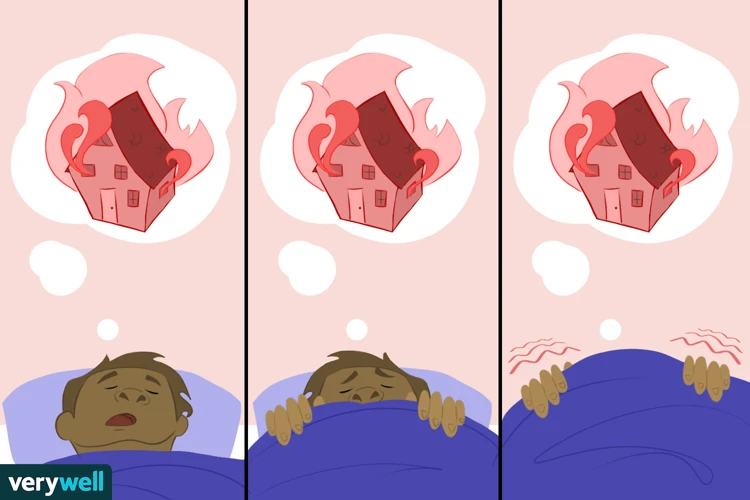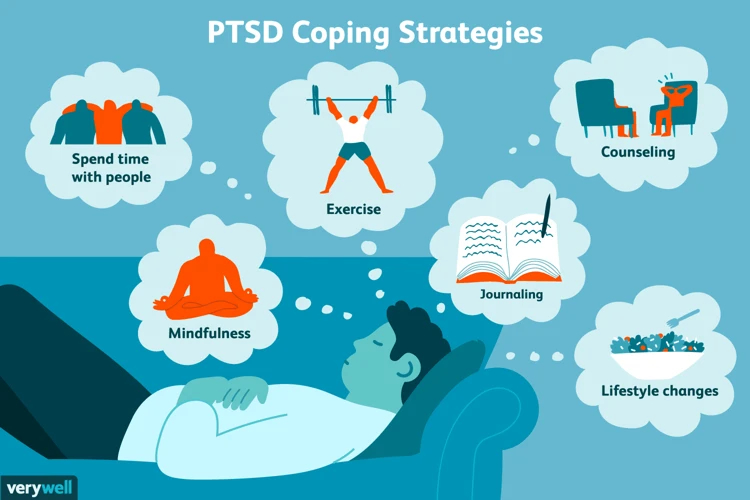As we lay in our beds at night, we all hope to have a peaceful and restful sleep, but sometimes our minds have other plans. Nightmares can be a jarring and terrifying experience, leaving us feeling helpless and confused upon waking. While occasional bad dreams are a normal part of life, some individuals may experience nightmares more frequently, which can greatly impact their mental health. In this article, we will explore the connection between nightmares and mental health, delving into the various types of nightmares and mental health issues they can be associated with. We will also examine the link between anxiety and nightmares, as well as how nightmares relate to post-traumatic stress disorder (PTSD). Lastly, we will offer effective strategies for managing nightmares and achieving a good night’s sleep.
Understanding Nightmares

Nightmares can be a confusing, unsettling experience for many individuals. During sleep, we enter a state of consciousness that is distinct from our waking lives. Sometimes, however, this altered state can manifest as vivid, frightening dreams that leave us feeling shaken long after we’ve woken up. It’s essential to understand the different types of nightmares to have a better grasp of their potential impacts on our mental health. In this section, we’ll explore the definition of nightmares and the various types of nightmares that individuals may experience.
Definition of Nightmares
Nightmares are a type of sleep disorder and are defined as vivid and terrifying dreams that cause a strong emotional response, usually fear or anxiety, and often cause the dreamer to awaken suddenly from sleep. According to the American Sleep Association, nightmares, are also characterized by visual imagery that is often illogical, but is experienced with a high degree of realism.
There are different types of nightmares, including recurrent nightmares, which are experienced repeatedly, and progressive nightmares, which get worse over time. In addition, people may experience post-traumatic nightmares, which are related to a specific traumatic event or experience.
While the occasional nightmare is normal, frequent nightmares can be a sign of an underlying mental health issue. It is important to seek help if nightmares are impacting daily life or causing significant distress.
Types of Nightmares
Nightmares are frightening and disturbing dreams that can leave a lasting impact on our mental health. There are different types of nightmares, each with its own unique qualities and characteristics. Here are some of the most common types of nightmares:
- Recurrent Nightmares: These nightmares are repeated over and over again, with the same or similar dream content. They can occur often and may be accompanied by sleep disturbances.
- Night Terrors: Night terrors are a more extreme form of nightmares. They cause a person to wake up in a state of panic or terror, with intense feelings of fear and anxiety.
- Lucid Nightmares: These nightmares are unique in that the dreamer is fully conscious and aware that they are having a nightmare. They can often control the dream and change the outcome, but they may still feel scared or distressed.
- False Awakenings: False awakenings are nightmares where the dreamer believes they have woken up, but they are actually still asleep and dreaming. This can create a feeling of confusion and disorientation.
- Sleep Paralysis: Sleep paralysis is a type of nightmare where the dreamer feels like they are awake but unable to move. They may also experience visual or auditory hallucinations.
Each type of nightmare can have significant impacts on a person’s mental health, leading to increased anxiety and feelings of isolation. Understanding the different types of nightmares can help individuals identify the type of nightmare they are experiencing and seek appropriate treatment to address any underlying mental health concerns.
Nightmares and Mental Health

Nightmares are not just scary dreams, they can also have serious impact on our mental health. Research has linked nightmares to a range of mental health issues, including anxiety disorders, depression, and post-traumatic stress disorder (PTSD). Understanding the connection between nightmares and mental health can help us identify potential underlying issues that require treatment. In this section, we will explore the various mental health problems that have been associated with nightmares and examine the latest research findings on the topic.
Mental Health Issues Linked to Nightmares
Nightmares are often indicative of deeper emotional and psychological issues that impact one’s mental health. Here are some of the mental health issues that are commonly linked to nightmares:
- Anxiety Disorders: People with anxiety disorders are reportedly more likely to experience nightmares. Nightmares can often magnify anxious thoughts and feelings, leading to a vicious cycle of anxiety and nightmares.
- Depression: Nightmares can often be seen in people with depression. Depression can lead to nightmares and vice versa, making it difficult to break the cycle.
- Post Traumatic Stress Disorder (PTSD): Nightmares are a prevalent symptom of PTSD. People who have experienced trauma, such as violence or abuse, often suffer from nightmares as a way for their mind to process the trauma.
- Substance Abuse Disorders: Substance abuse and alcoholism can result in nightmares. Substance use can disrupt sleep patterns, leading to vivid and disturbing dreams.
- Schizophrenia: People with schizophrenia often experience nightmares as a symptom of the disorder. Nightmares may be particularly disturbing and vivid for individuals with schizophrenia.
It is important to note that while nightmares can be a sign of mental health concerns, they do not always indicate a psychological issue. However, if nightmares are frequent and impact daily life, it may be helpful to seek professional support to manage these experiences.
Research Findings on Nightmares and Mental Health
Research has shown a strong connection between nightmares and mental health issues. According to a study published in the Journal of Clinical Sleep Medicine, individuals who experience frequent nightmares are more likely to have mental health problems compared to those who do not experience them. The table below highlights some of the key research findings on the link between nightmares and mental health:
| Mental Health Problem | Connection to Nightmares |
|---|---|
| Anxiety Disorders | Those with anxiety disorders are more likely to experience nightmares. |
| Depression | Individuals with depression are more likely to have nightmares, and frequent nightmares increase the risk of developing depression. |
| PTSD | Recurrent nightmares are a hallmark symptom of post-traumatic stress disorder (PTSD). |
| Substance Abuse | Those with substance use disorders are more likely to experience nightmares, which can exacerbate their mental health problems. |
| Suicidal Ideation | Studies have found a link between nightmares and an increased risk of suicidal ideation and behavior. |
These findings suggest that addressing nightmares may be a crucial aspect of treating and managing various mental health issues. It is important to seek professional help if nightmares or other sleep disturbances are affecting one’s mental health and quality of life.
Anxiety and Nightmares

As if living with anxiety isn’t challenging enough, it can also lead to having nightmares. Nightmares are vividly disturbing dreams that can involve physical sensations and leave individuals feeling overwhelmed and frightened. For those with anxiety, these nightmares can trigger an array of emotions and worsen symptoms. But why do nightmares trigger anxiety, and what can be done to manage them? Let’s delve into the link between anxiety and nightmares and explore effective strategies for managing these symptoms.
Why Nightmares Trigger Anxiety
One reason why nightmares trigger anxiety is because they can make individuals feel a loss of control. During a nightmare, the dreamer is often placed in a terrifying or dangerous situation, but is unable to escape. This feeling of powerlessness can translate to real-life situations, causing individuals to feel vulnerable and anxious.
Another factor is the emotional intensity of nightmares. Nightmares often induce strong emotions such as fear, sadness, and anger, which can create a lasting impact on an individual’s mental state. This emotional intensity can lead to increased anxiety, even after the nightmare has ended.
The content of nightmares can also be a trigger for anxiety. Nightmares often involve traumatic experiences, such as natural disasters or physical harm, which can cause individuals to feel anxious or fearful in their waking life. Additionally, nightmares that involve social rejection or embarrassment can cause feelings of anxiety and low self-esteem.
The disruption to sleep caused by nightmares can also contribute to anxiety. Interrupted sleep can leave individuals feeling tired and on edge, leading to increased stress levels and anxious thoughts.
There are many reasons why nightmares can trigger anxiety, including feelings of powerlessness, emotional intensity, traumatic content, and sleep disruption. It is important to address concerns about nightmares and their impact on mental health in order to prevent anxiety and promote healthy sleep.
| Reasons Why Nightmares Trigger Anxiety |
|---|
| Loss of control during nightmares |
| Emotional intensity of nightmares |
| Traumatic content of nightmares |
| Sleep disruption caused by nightmares |
How to Manage Nightmares and Anxiety
There are several strategies that can be helpful in managing nightmares and the resulting anxiety. Some approaches to consider include:
- Mindful Breathing: With mindful breathing, one can focus on one’s breath, taking deep, slow breaths in through the nose and out through the mouth. This can help to calm the body and ease anxiety.
- Relaxation Techniques: Practicing relaxation techniques like yoga, meditation, or progressive muscle relaxation may help reduce anxiety and promote better sleep.
- Journaling: Keeping a journal of dreams or nightmares can help bring insight and awareness to any underlying emotions or triggers. It can also help process and release any unresolved feelings.
- Talk Therapy: Speaking with a therapist can provide emotional support, help identify underlying causes of anxiety or trauma, and provide tools for managing symptoms.
- Medication: In some cases, medication may be recommended to help manage anxiety related to nightmares. Antidepressants or anti-anxiety medications may be beneficial, but it is important to discuss the potential risks and benefits with a healthcare provider.
It is important to note that managing nightmares and anxiety may involve a combination of strategies and may take time to find what works best for each individual. It is also important to prioritize self-care, including regular exercise, a healthy diet, and good sleep hygiene, as these can all contribute to better mental health and well-being.
PTSD and Nightmares

The connection between nightmares and PTSD is a complex and often overwhelming topic. Individuals who have experienced trauma or have been diagnosed with PTSD are more likely to have nightmares that can have a significant impact on their overall mental health. Despite the prevalence of nightmares in PTSD, the mechanisms underlying these nightmares are not well understood, adding to the complexity of effective treatment. In this section, we will explore how nightmares are linked to PTSD and the different therapeutic interventions that can help manage these distressing symptoms.
How Nightmares are Linked to PTSD
Post-traumatic stress disorder (PTSD) is a mental health condition that can affect people who have experienced or witnessed a traumatic event. Nightmares are a common symptom of PTSD and are closely linked to the condition. Here are some ways in which nightmares are linked to PTSD:
- Intrusive memories: Nightmares may be a result of intrusive memories, which are common in people with PTSD. These memories can be triggered by certain events or stimuli and can cause the person to relive the traumatic event. This reliving of the trauma can lead to intense anxiety and fear, which can then manifest in the form of nightmares.
- Hypervigilance: People with PTSD often experience hypervigilance, which is a state of heightened awareness and alertness. This can cause the person to have heightened sensory processing during sleep, which may cause them to wake up frequently during the night. These frequent awakenings and disruptions to sleep can trigger nightmares.
- Changes in brain activity: Studies have shown that people with PTSD have changes in their brain activity, particularly in the areas associated with fear and anxiety. These changes can make the person more susceptible to nightmares and can also make the nightmares more intense and vivid.
- Emotional responses: Nightmares can be a way for the brain to process and deal with the intense emotions associated with PTSD. This can include feelings of fear, anxiety, guilt, and shame. When these emotions are not dealt with during waking hours, they may come up during sleep, leading to nightmares.
Understanding how nightmares are linked to PTSD is important in developing effective therapeutic interventions to manage the condition. Fortunately, there are a variety of therapeutic techniques available to help reduce the frequency and intensity of nightmares in people with PTSD.
Therapeutic Interventions for PTSD and Nightmares
One of the most effective ways to manage PTSD-related nightmares is to seek therapeutic interventions. These interventions can range from talking therapies to medication, and they are designed to help patients manage their symptoms and improve their overall mental health. Here are some of the most common therapeutic interventions for PTSD and nightmares:
| Intervention | Description |
|---|---|
| Cognitive Behavioral Therapy (CBT) | CBT is a talking therapy that aims to help individuals understand and change negative thought patterns and behaviors. This therapy can be especially helpful for patients with PTSD-related nightmares. |
| Prolonged Exposure Therapy (PE) | PE is a type of therapy that helps patients confront and process traumatic memories. This can help reduce the frequency and severity of nightmares related to PTSD. |
| Eye Movement Desensitization and Reprocessing (EMDR) | EMDR is a therapy that involves focusing on a traumatic memory while simultaneously performing a task that requires bilateral movement, such as moving the eyes from side to side. This therapy can help reduce the intensity of PTSD-related nightmares. |
| Nightmare-Focused Cognitive Behavioral Therapy (NF-CBT) | NF-CBT is a type of therapy specifically designed to treat nightmares. This therapy involves learning strategies to manage nightmares, such as creating a calming bedtime routine and developing positive coping skills. |
| Medication | In some cases, medication may be prescribed to help manage PTSD-related symptoms, including nightmares. Commonly prescribed medications include antidepressants and prazosin, a medication that can help reduce the intensity of nightmares. |
It’s important to note that different therapies work for different people, and it may take some trial and error to find the right intervention for managing PTSD-related nightmares. However, seeking help from a mental health professional can be a vital first step in improving overall mental health and reducing the frequency and severity of nightmares.
Effective Strategies for Managing Nightmares
For those who suffer from nightmares, the experience can be traumatizing and can lead to significant distress. While treatment for underlying mental health conditions can often alleviate the frequency and severity of nightmares, there are also effective strategies that can be implemented to manage nightmares on a day-to-day basis. These strategies include lifestyle changes and therapeutic techniques, some of which have been found to be highly effective in reducing the frequency of nightmares and improving overall sleep quality. Let’s take a closer look at these strategies and how they can help provide relief from the pain and anxiety that nightmares can cause.
Lifestyle Changes
Making some lifestyle changes can be a helpful first step in managing nightmares. Here are some strategies that you might find helpful:
| Strategy | Description |
|---|---|
| Establish a regular sleep routine | Going to bed at the same time each night and waking up at the same time each morning can help regulate your body’s sleep-wake cycle. |
| Avoid caffeine, nicotine, and alcohol | These substances can interfere with sleep quality and increase the likelihood of nightmares. |
| Exercise regularly | Regular exercise has been shown to improve sleep quality and reduce symptoms of anxiety and depression, which can contribute to nightmares. |
| Practice relaxation techniques | Deep breathing, progressive muscle relaxation, and other relaxation techniques can help reduce stress and anxiety, which can contribute to nightmares. |
| Reduce screen time before bed | The blue light emitted by electronic devices can interfere with the body’s production of melatonin, which can disrupt sleep and contribute to nightmares. |
Keep in mind that making lifestyle changes alone may not be enough to manage severe nightmares or underlying mental health conditions. However, incorporating these strategies into your routine can be a helpful part of a comprehensive treatment plan. Consult with a healthcare professional for personalized recommendations tailored to your specific situation.
Therapeutic Techniques
When it comes to managing nightmares, there are several therapeutic techniques that can be effective. Here are some of the most common:
- Cognitive Behavioral Therapy (CBT): CBT is a type of talk therapy that focuses on changing negative thought patterns and beliefs that contribute to anxiety and other mental health issues. A CBT therapist can help individuals identify and challenge negative thoughts that may be contributing to their nightmares, and work on developing more positive and constructive thinking habits.
- Exposure Therapy: Exposure therapy involves gradually exposing individuals to the things that trigger their nightmares, with the aim of helping them become less sensitive to those triggers over time. For example, if someone has nightmares related to a traumatic event, exposure therapy might involve gradually revisiting the memories of that event in a safe and supportive environment.
- Eye Movement Desensitization and Reprocessing (EMDR): EMDR is a relatively new therapy technique that has been shown to be effective in treating PTSD and other trauma-related conditions. EMDR involves having individuals focus on a traumatic memory while also engaging in a specific type of eye movement or other bilateral stimulation. This technique is thought to help process the memory in a way that reduces its emotional impact and associated symptoms.
- Mindfulness-Based Interventions: Mindfulness-based interventions involve training individuals to focus their attention on the present moment and to observe their thoughts and emotions without judgment. This can help individuals become more aware of their triggers and more skilled at managing their responses to them. Mindfulness techniques can be integrated into therapy sessions or practiced on an ongoing basis outside of therapy.
These are just a few examples of the many therapeutic techniques that can be used to help individuals manage nightmares and related conditions. Of course, the specific approach that is most appropriate will depend on the individual’s unique needs and circumstances. A qualified mental health professional can help determine the best course of treatment for each individual.
Conclusion
In conclusion, the connection between nightmares and mental health cannot be overstated. Our dreams can often reflect the state of our mental and emotional well-being. It is important to understand that nightmares can be a symptom of various mental health issues, such as anxiety and PTSD.
For those who suffer from nightmares, it is essential to seek professional help. Therapeutic interventions such as cognitive-behavioral therapy and exposure therapy have shown promising results in managing and reducing the frequency of nightmares.
Lifestyle changes such as exercise, maintaining a healthy diet, and improving sleep habits can also help to reduce the occurrence of nightmares. It is essential to practice good sleep hygiene and create a relaxing bedtime routine.
In addition to seeking professional treatment, it is helpful to have a support system. Talking to a trusted friend or family member can provide comfort and reassurance.
In conclusion, understanding the connection between nightmares and mental health is vital to promote overall well-being. With the proper treatment and management, nightmares can be reduced, improving overall quality of life.
Frequently Asked Questions
Can nightmares be a sign of mental illness?
Yes, nightmares can be a symptom of mental health conditions such as anxiety disorders, PTSD, and depression.
Can medication cause nightmares?
Yes, certain medications, such as antidepressants and blood pressure medications, may contribute to nightmares as a side effect.
Do nightmares affect children differently than adults?
Yes, children may experience nightmares more frequently than adults, and their nightmares may be linked to different fears or experiences.
Can nightmares be inherited?
There is some evidence to suggest that nightmares may have a genetic component, but more research is needed to understand the full extent of this connection.
Are there different types of nightmares?
Yes, some common types of nightmares include recurring nightmares, anxiety nightmares, and trauma-related nightmares.
How can therapy help with nightmares?
Therapy can help individuals identify and address underlying mental health concerns that may be contributing to their nightmares, and can also provide coping strategies for managing nightmares when they occur.
Can lucid dreaming techniques be used to prevent nightmares?
Some individuals may find that lucid dreaming techniques, which involve trying to take control of and influence the content of one’s dreams, can be helpful in preventing nightmares.
Can changes in diet or exercise help reduce nightmares?
Making lifestyle changes such as reducing alcohol consumption or incorporating relaxation techniques into one’s daily routine may help reduce the occurrence of nightmares.
Is there a connection between nightmares and sleep apnea?
Yes, individuals with sleep apnea may be more likely to experience nightmares or other sleep disturbances as a result of their breathing difficulties during the night.
Can nightmares ever be a positive experience?
While nightmares are generally seen as unpleasant experiences, some individuals may find that they can serve as an opportunity for personal growth or self-reflection.








